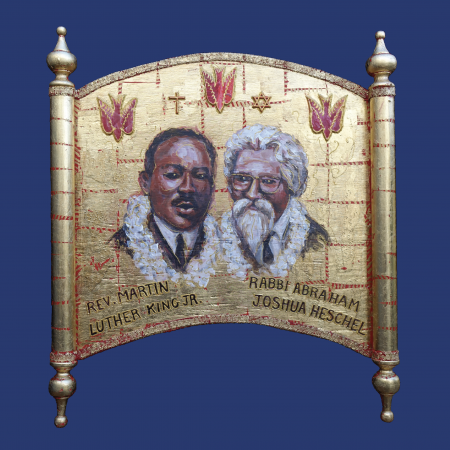Dr. King, the son of a preacher, had been reared in the racially segregated South where he witnessed the brutal racial oppression of African Americans.
Rabbi Heschel was reared in Warsaw, Poland, where he experienced the horrific ravages of European anti- semitism. His mother and sister had been murdered by the Nazis.
The relationship between Heschel and King began in January 1963 when they met at a Religion and Race conference in Chicago where Heschel gave a major address. Perhaps Rabbi Heschel and Dr. King became allies and close personal friends because they shared a belief in peace and justice and the interconnection of the political and the spiritual.
Both spoke about God being deeply involved in the affairs of human history. Social activism was required by people of religious faith, Heschel and King argued, particularly when society had developed immoral institutional structures. Heschel noted: “Your highest loyalty is to God and not to the mores, the folkways, the state or the nation or any human made institution.” In the final lecture of the conference, King gave a stirring “Challenge to the Churches and Synagogues”, which included a harsh diagnosis of the state of racism in the United States: “One hundred years after the Emancipation Proclamation the Negro is still dominated politically, exploited economically and humiliated socially…”
On March 19, 1965, two days before the Voting Rights March from Selma to Montgomery, Heschel received a telegram from King, inviting him to join the March. Heschel was welcomed into the front row of marchers as one of the leaders with Ralph Bunche and Ralph Abernathy. Each of them wore flower leis brought by Hawaiian delegates. For Heschel, mystic and social activist, the march had a powerful significance: “For many of us the march from Selma to Montgomery was about protest and prayer. Legs are not lips and walking is not kneeling. And yet our legs uttered songs. Even without words, our march was worship. I felt my legs were praying.”
If Dr. King’s belief in the power of non-violence to “transform the enemy into a friend” influenced Rabbi Heschel’s involvement in the Civil Rights Movement, it was Heschel who influenced King to add his voice to the Anti-War Movement. The two were together again on April 4, 1967 at Riverside Church in New York City where King spoke out for the first time against America’s involvement in the Viet Nam War. As one scholar noted: “The spiritual alliance of Heschel and King was renewed before an audience of more than three thousand.”
That spiritual bond between King and Heschel was based upon their shared belief in and focus on the “sanctity of the human being in the eyes of God.”

